From YouTube star to New York barbecue-house owner. That’s the story in a nutshell of today’s guest, Daniel Delaney. Listen in if you’re keen to discover smart restaurant marketing ideas … or how creating helpful marketing on YouTube can open up some amazing opportunities.
SO, if you love nothing more than to chomp on a slab of brisket, you are going to love this week’s chat with Daniel Delaney, the founder of Delaney Barbecue. Daniel knows his way around a piece of meat, but more importantly, he’s brimming with business savvy too. Before starting his twin businesses of BrisketTown, a brisket restaurant, and Smokeline, a mobile brisket vendor, Daniel immersed himself in the food world and became a person of real influence by creating authoritative, engaging video content on YouTube that foodies loved to watch and share.
Do you want to have more influence and authority in your business niche? Do you need a boost of inspiration to make you take action? If so, Daniel has golden words for you throughout every minute of this chat. Let’s waste no time and get stuck right into Episode 216 of Australia’s #1 marketing show!
Episode Timeline
- 1.45 You don’t have to build your business alone. Lean on the experts at 99Designs and Netregistry for help with design and online marketing.
- 5.30 Introducing barbecue expert, Daniel Delaney. But is his favourite food actually barbecue?
- 8.30 Daniel’s interest in the food business goes right back to his university thesis on the design of mobile food vending.
- 12.45 The powerful idea of doing one thing really well.
- 17.00 The start of content creation for Daniel. How did VendrTV come about?
- 21.00 How did Daniel become an influencer in his business niche?
- 31.00 Moving on from video content exclusively, and knowing when it’s right to move on.
- 35.00 The beginnings of “Brisket Lab” and figuring out how to make a barbecue business work.
- 46.00 Why Daniel loves to move quickly in business.
- 50.45 Daniel’s issues with being a patient leader.
- 52.00 Daniel describes his rigorous process to find the best assistant.
- 60.45 My top 5 learnings from this week’s fireside chat.
- 63.00 Inspirational quote of the week!
Resources and Links Mentioned in this Episode
- 99Designs design marketplace: For logo design, brochure design, and more. Grab your exclusive listener upgrade at this link.
- Netregistry: Get your online marketing sorted!
- Delaney Barbecue official website
- BrisketTown restaurant website
- Smokeline official website
- MailChimp for professional mailouts
- LaunchRock for website launch pages
- Asana for project management
- Crazy Egg for website heat maps
- Join the The Small Business Big Marketing Forum today!
- Crank My Marketing
Daniel Delaney’s Interview Transcription
Daniel Delaney:
I found myself scratching my head and decided that what I would do was – I don’t know if you know Ze Frank, but I was a big follower of his at the time.
Timbo:
Who is he?
Daniel Delaney:
I think it’s a little bit dated now, but I think that he – when somebody says to me point to one of the most creative thinkers on the Internet, this is the person I go to. When podcasting wasn’t even a thing, he created this show. He did it every day for a year. He was one of the most engaging individuals. I mean, he did these fun projects like one that just comes to mind was Earth Sandwich.
He said through this community that he built, he said another person that watches this show at your exact inversed latitude and longitude and put a piece of bread down on the globe, the earth. Take a photo. He had just the most amazing participatory activities. Really worth checking out. He speaks at TED and all these things now.
Timbo:
Oh, really?
Daniel Delaney:
Yeah.
Timbo:
Okay. I interviewed one of the TED X writers last week. Zay Frank. Is that Z-A-Y?
Daniel Delaney:
No, it’s just Ze Frank. Yeah.
Timbo:
Yeah, we’re pretty weird over here the way we pronounce stuff. Or maybe you are. I don’t know. Okay. So he inspired you.
Daniel Delaney:
Definitely. Then, I started becoming friendly with Gary Vaynerchuk and I was at the library –
Timbo:
You are dropping names now.
Daniel Delaney:
Right, I know.
Timbo:
Gary V. Are you going to introduce me to Gary V?
Daniel Delaney:
Do you not know him?
Timbo:
Mate. You get him on this show. I will come to your smokehouse and give you a very unusual hug.
Daniel Delaney:
Of course. I mean, I would love to make that introduction.
Timbo:
Thank you.
Daniel Delaney:
Yeah, I started hanging out with him in New Jersey when he was kind of podcasting with Wine Library. I think he was very influenced by Ze Frank to get started. I became more and more interested in podcasting. Then, also some of the folks like Kevin Rose and such and Revision Three. So I was very inspired by what they were doing. I really liked it and decided there’s no – this is interesting thought, we’re at the point in technology. We were in 2009 as well where there’s no reason that we cannot – that anybody – cannot produce the quality of content that you see on television or greater.
Timbo:
Hallelujah.
Daniel Delaney:
Technology is so inexpensive. So I called upon, you know, I had all these people that I went to school with that had great degrees in design and film and this and that. I just said, hey, let’s make a show about food trucks. It just coincided with the fact that in the United States at that time it started to bubble. People were excited about food trucks very much thanks to the one in Los Angeles called Kogy and one in New York called the Wafle and Dinges. These two food trucks became really popular on social media. They very much sparked a little bit of a renaissance –
Timbo:
Could you just hold that thought there because I think food trucks – I would love to speak to a food truck vendor. I will. In fact, I was in LA a few months ago. Boy, oh, boy. We don’t have – we have so many rules and regulations around food trucks in Australia, Daniel, that they’re very hard things. We don’t have as many over here. But just talking about food trucks, tell me, you’ve got more experience with them than I have. They just do one thing really well don’t they, therefore, they become known for that thing. It’s just such a great marketing ploy.
Daniel Delaney:
Yeah. I think that as we look through the history of food, this is not a new idea. The idea of doing one thing great is like the tech shops, right. Or it’s like the pizza parlor. This model of doing one thing really well, I think it comes in ebbs and flows. It is barbecue. It is fried chicken. Then, we go through a period of time where we’re much more interested in diversity. Then, we focus again. I think right now at least in New York, we’re very much focusing again. We’re becoming very specific about what we do. I think food trucks became really popular because it was again, the right time and the right place.
In the United States and I guess globally obviously there’s the recession was hitting. People wanted not only food that was comforting which food trucks often provided, but they wanted to be able to dine out well without spending so much money. So it was the perfect marriage at that moment.
Timbo:
And Twitter kind of played a role too, didn’t it?
Daniel Delaney:
Absolutely. The idea of being able to communicate very quickly. The idea of being able to communicate mobilely on the fly. Yeah, it was the great alchemy, I think.
Timbo:
Okay. So you started a YouTube channel called Vendr TV, yeah?
Daniel Delaney:
Yeah, I started – I don’t know if I threw out the word blip.tv if that makes sense to you. I started doing the show there really just focusing on ITunes. Eventually, the show – well, it got picked up by a company that got bought by YouTube. They helped us at that time with some of the distribution. They helped us make enough money to be able to keep the show going. It was a company called Next New Networks. It got acquired by YouTube.
Timbo:
Okay. Because I was watching Vendr TV the other day and it listed it’s Vendr TV. V-E-N-D-R TV if you go to YouTube and look at it. I was like, wow, you’re production quality is really high. I mean, this is not shot on your IPhone and quickly uploaded. I mean, there’s angles. There’s cuts. There’s all sorts of stuff going on there. So you were traveling around the states with some friends. You had some funding by a production company to make this Vendr TV happen, yeah?
Daniel Delaney:
You know, in the beginning, it was boot strapped. We just started doing it. I had the good fortune of going to a university that gives their alumni access to technology for free for life. So I took advantage of that. I got some nice cameras and wireless labs and this and that. We just started doing it in New York with no real game plan. Just like can we do this? Doing it is sometimes so important. Refine later. Do now. We just did it. It sucked. It was horrible. We did it again, and it got a little better. We got more efficient. We didn’t need to bring eight people.
We could bring three people. We just learned how to become a little bit lean and agile. Then, the show was starting to get some traction. It was also getting traction because I was – can I say – I was being a whore. You know, sending it out to the Times. Please, wouldn’t this be a great thing to write about? Whoever I thought could potentially be interested. I got serious Eats at the time was posting each of the videos. It was becoming attractive to Next New Networks to help us because there was some viewership. Over time, those videos started to grow. Actually, all the stuff that’s on YouTube is – it’s very new to YouTube.
Timbo:
I was going to say because of the numbers. I can’t always take comfort in low numbers because it means that it’s like, you know, it shouldn’t scare people off from thinking they have to get millions of viewers. Your views on YouTube are low, but it was obviously available elsewhere.
Daniel Delaney:
Well, that’s a very small disinteresting or not very interesting point. We had to remove the content and put it back up recently do to just licensing.
Timbo:
Oh, bummer.
Daniel Delaney:
Yeah. But I will say at the time that we were producing the show, the vast majority of our viewership was through ITunes. It was not through YouTube at all.
Timbo:
Right. So, Daniel, Vendr TV – what did you hope – was there a commercial outcome or were you creating out at this point?
Daniel Delaney:
No, I’m very – I’m only now starting to look at the commercial side of anything. But everything was art. I was looking for a fun thing to do. It was much better than sitting behind a desk. I was traveling to all these states with friends. We rented convertibles. So we were just driving. It was fun. It was very intense. We would get to a city. I remember one day in Portland, Oregon. We got up at like 6:00 a.m. and filmed a breakfast place. We filmed five episodes in one day.
Actually, it was fun at that point. I stopped changing. I bought all of the same clothes so that we could do pick up shots on other days. I would never have to worry about the uniform matching. So I would wear the same thing every day just to be efficient. Yeah.
Timbo:
I just read an article about Zuckerberg. He wears the same clothes every day. It’s one less decision he has to make.
Daniel Delaney:
It makes sense.
Timbo:
Yeah, totally. So, Daniel, Vendr TV, 29 episodes in. It’s finished. You’ve moved on. What was the reason for moving on? What did you do next?
Daniel Delaney:
We produced probably about 140 episodes or so. Yeah. There were many more. I don’t know why they’re not showing them. We produced more. Why did we move on? I think that I like starting things. I like trying things. I think that we got to a point where my camera crew needed to start to make, you know, wanted to have a job. It was great. For me, it helped me solidify myself in the food community. People really liked the show. They were excited about it. Actually, it’s totally integral to the rest of the story. So by way of doing this, I started to do some consulting.
There’s a tech company called Square Space. I became very close with them. They asked me to basically organize their events at South by Southwest for two years. We put on these massive takeover of a street corner that I rented because of this food truck knowledge. Rented a food truck and operated it. We brought on all of these wonderful, you know, Franklin Barbecue and Paul Key who won top chef and all these really great people in Austin to come and sort of giveaway food from this truck. The byproduct of this was that I had to go live in Austin.
So for two years, I had lived for about a month and a half to two months in Austin while I was preparing this truck for South by Southwest. Doing that really sort of – I was eating a lot of Barbecue. I really fell in love with it. I fell in love with the culture. So it was sort of that next domino. It allowed me to, I think, get a real taste for barbecue and learn that – again, I never even thought it would be a commercial thing, but I thought it would be a great project to try and do.
Timbo:
Up until this time, clearly a vegetarian.
Daniel Delaney:
Oh, God. No, no, no. So, yeah.
Timbo:
So what’s interesting at this point is that you’re a young bloke who decide to go, okay. Well, this new modern world of marketing, as you said, allows to produce quality TV quality content no matter who we are. You’re inspired by someone like Gary Vaynerchuk. You go and start Vendr TV as a no one in the food industry in New York. The next thing you do, you lean into this concept. You make it your own.
You’re making engaging entertaining content. Let’s not shirk away from the fact that you love the camera. You love a chat. You love informing and entertaining people. The next thing you know, you start to become a person of influence in an industry in which you’re interested. This is how it works.
Daniel Delaney:
Yeah, how about that.
Timbo:
Yeah. Yeah. Gosh, you know, I just want listeners to understand this point. You get it. Previous guests like Melissa Maker of Clean My Space get it. If you just put yourself out there and either share your opinions or facilitate others to share their opinions which is what you were doing with food truck vendors, good stuff happens.
Daniel Delaney:
Absolutely. I mean, the way you phrase it is very inspiring. The way I would say it is that people are really hungry. They’re really hungry to like – media is really hungry for stories. People are really hungry to learn. I say it this way because I think that when I look at it in a very tangible sense, it’s really not that hard. Like if people are not talking about you, I think that you’re doing something wrong.
The barriers are really low right now. People are so hungry for information. Even though it’s noisy, you know, the space that we’re in is very noisy. A lot of people are talking. With a little elbow grease, I don’t think that it’s very difficult to push yourself forward.
Timbo:
You know, I find that really interesting coming from you who is sitting over in New York and go to other parts of America. I say this from my keynotes from stage when in Australia because the bar really is low here. Any Australian or New Zealand person listening to this, the bar is low. Do what we are talking about right now. You will win. In America, it is crowded. You guys are ahead of the game. There are a lot more of you doing a lot more of this, but it doesn’t – I love the fact that you are still upbeat and saying that there’s still an opportunity to do what essentially is helpful marketing.
Daniel Delaney:
I mean, absolutely. The other phrase – I don’t know if you ever read the book by Marty Neumeier called Zag, but I think that one of the most important – we were a counter service restaurant. You walk up and get your food. At a certain point, we saw other barbecue places that were opening that were doing the same thing, and we switched to be a table service restaurant. Then, we said how do we build the most romantic barbecue place. A place you want to go on a date. You know, the point is the only thing that you can’t do is stand still. If you’re not moving, you’re sinking. You have to be dynamic. Can’t stop.
Timbo:
Okay. So, Daniel, moving on from Vendr TV. What was next? You did this work at South by Southwest. Obviously, that gets you big, again, that builds your exposure, your personal brand. Did you then start What’s This Food? When did that begin?
Daniel Delaney:
It was all happening – it was definitely an overlap. I remember working South by Southwest and also every morning waking up early and filming What’s This Food. I was doing a lot of things at once. I was juggling a lot.
Timbo:
Explain What’s This Food.
Daniel Delaney:
Well, I guess the only idea that never made sense to me was just getting a job. I like exploiting what I’m doing which means if I can also derive learning out of making money. Or if I can, for example, build credibility by making money, that’s awesome. So What’s This Food was I just wanted to learn more about cooking. I wanted to learn more about ingredients. I think it truthfully came out of a desire to build an – well, at that time – shoot. As I think about it, it’s all going back to – in college, I kind of designed a prototype for a thing called receiptbo.
The idea was that – this is obviously pre- IPhone. It was like a little Casio device where you could go into the grocery store and type in cherimoya or you could type in kiwano melon or something like this. It would tell you what that is and show you how to cook with it. This was always an idea I had in the back of my head. What’s This Food was how I knew to actualize that. So sometimes when you have these ideas for too long, you have to do something about them. That was this. What’s interesting about this – so I also wanted to exercise making things more. I like producing things. I don’t like not moving.
So I wanted to set some constraints. The constraints were I would produce a video every single day. I started on January 1st. I would do it seven days a week. Each video had to be an ingredient that I didn’t know anything about. I would sort the ingredient, learn about it, create a recipe in just one day, film the episode, edit the episode, and post it in one day. Then, the other thing that’s really fun about this is that I also thought this would be a great opportunity to try alternate sources of generating revenue.
So instead of placing ads on platforms like – let’s say platforms that are going to display advertising in the pre-roll or at the end of the video. I thought what if we do more integrated advertising. So I sold every single day of the year – I sold advertising against the content manually.
Timbo:
I was wondering what those little spots were. Just to explain, if you watch an episode of What’s This Food on Daniel’s YouTube Channel, the first thing you do is a live read to camera of an obscure brand that you probably never heard of, but it’s relevant to what you’re talking about in that episode.
Daniel Delaney:
Yeah. So in between filming and shooting, I was also picking up the phone and selling these ads against each day’s videos.
Timbo:
What’s it like surviving on an hour of sleep?
Daniel Delaney:
Well, my girlfriend at the time was committed to this. She quit her job. We just did this together. It was a fun but also harrowing experience.
Timbo:
That sponsorship thing. Interesting. So did that work? You were ringing people saying I’m about to do – like I’m looking at one, how to make a pumpkin pie. What are pumpkins? Who did you approach for that episode? How did you identify them? What did you charge them?
Daniel Delaney:
So we basically just trawled the Internet direct to find Artisanal food brands that we would reach out to. We definitely were sending out sort of like batch emails, you know, sort of template emails just to see if there would be any interested leads. Ultimately, there had been this – I’m forgetting what it’s called – but there was this E-commerce platform that was again another little nugget in my mind. An E-commerce platform that sold like unique items. They would do a limited quantity of them. So you would have 100 items. The first item would be $1.00. The second item would be $2.00. The third would be $3.00.
So it was like a custom Lego or a limited edition paintings. The guy would produce 100 paintings. So if you bought the 100th painting, it would be $100.00. But if you bought the second painting, you’d pay $2.00 for it. So there’s an equation which is you take the highest number and multiply it by the highest number minus one, you divide by two. It tells you what the gross is if you sell it all. So I applied that to a calendar. So the first day was $1.00. Second was $2.00. Third was $3.00. The last day like Christmas or rather December 31st will be $365.00.
Timbo:
That’s clever because your audience is building as well. Like any of those prices are cheap, but I get the principle.
Daniel Delaney:
That was the idea. I don’t know looking back at it that any of these ideas were the best ideas, but I built a lot of muscles doing this. Regardless, I’m clearly not doing that anymore, but I can extrapolate a lot of the learnings toward what I’m doing now. Ultimately, that’s what is the most valuable, I think.
Timbo:
So 365 episodes later of What’s This Food.
Daniel Delaney:
Well, I made it through about 260. It just didn’t – I couldn’t do it. I tried. But I’m proud of 260 something.
Timbo:
So you should be. So did an opportunity come knocking?
Daniel Delaney:
I think that it was I was getting to this point now where things were overlapping. I started to become more interested in barbecue. So at a certain point, I think I had to make a decision. I decided not to continue doing the show because I wanted to try and pursue this. It did get increasingly tiring to try and sell these. There was no automation to the sales. I think that got a little tiring.
Timbo:
Good. I love that. The fact that you strengthened some muscles. I love that idea where you got good at stuff. You built some confidence. Great for recognizing it’s time to move on. I think often many business owners may fear moving on. They’re kind of like it’s kind of working, you know. If I move on, the next thing might not work at all. So I think there’s courage in that. You had a pivotal moment then, Daniel, in New Orleans.
Daniel Delaney:
Yeah.
Timbo:
Jump too far ahead, but I do love this moment.
Daniel Delaney:
What is the moment?
Timbo:
Well, when you were at this festival and you met this fellow Michael Stearn. He introduced you to – have I triggered that?
Daniel Delaney:
Sure, sure, sure. Yeah, I get it. Michael, oh, he’s a gem. A really great guy. So Michael, as a plug for him, is the author of a series of books called Road Food which if anybody travels to the state, it’s a worthy read. It kind of shows you all of the little off beat diners and roadside stands in the country that produce really great food. He and his wife traveled the country chronicling all of this. He was definitely an inspiration. He asked me to come down to New Orleans to film an episode of Vendr TV about a festival he was having in the French Quarters in New Orleans.
While I was there, I met a gentleman named Wayne Miller from Louie Miller Barbecue in Taylor, Texas who drove his smoker to New Orleans for this festival to cook brisket. I tried his brisket. My mind was blown entirely. It was like nothing. It was really like nothing I had ever eaten in my life. I’ve created, you know, I’ve said it must be like a blind person seeing or something. It’s just you didn’t know that your mouth could do such things.
Timbo:
Wow.
Daniel Delaney:
Yeah. I found that very inspiring and that definitely was part of the encouragement to let me start cooking barbecue. So back in Brooklyn, I started a Barbecue Supper Club. All these little projects, geez.
Timbo:
Did you not – when was the point because now we’re getting to the point where we’re going to talk about your current businesses. Did you not purchase – I don’t know what you call them – a smoker? A large, large barbecue that you towed back from Texas to New York illegally?
Daniel Delaney:
Yeah. I did. I mean, that was definitely after I had been tinkering with barbecue for a while.
Timbo:
Like I said, I’m going to get serious now. I’m going to buy the big stuff.
Daniel Delaney:
Exactly. So I was down in Austin and talked to a friend of mine who owns a barbecue place. He hooked it up. He said if you think you want to do this, he said here, take one of my smokers. I brought that up to New York without any game plan whatsoever. Put it in my very generous family’s backyard. I didn’t know what to do. I knew a lot of things. I knew that cooking on it would be illegal. I knew that I didn’t have a kitchen that was commercial.
Nor did I have the money to basically start that. Nor did I have the money to buy meat. Nor did I have an audience that was going to eat the hundreds and hundreds of pounds of brisket that one load on the smoker produces.
Timbo:
But what you did know was that the brisket that Wayne cooked was mind blowing. You needed to somehow get close to recreating that.
Daniel Delaney:
Exactly. Exactly. So the start of my business is – starts now with this project that we call Brisket Lab. Brisket Lab was a way that I would solve all those bullets. Meaning cook without a kitchen, being legal, not have to have money, and whatever. So what we did was we basically presold barbecue online. Meaning, that we sold people sort of like – basically like a gift certificate if you will. Or really currency, like a gift coin. We sold people this alternate currency which was brisket. We sold a lot of it. We sold about – the original goal was around 3600 pounds of brisket in just about 48 hours. We sold that at $25.00 a pound.
Timbo:
No one had tried it.
Daniel Delaney:
No. No one had tried it. It was sight unseen.
Timbo:
What?
Daniel Delaney:
We didn’t tell people where they’d be able to redeem it. We provided no dates. It was all completely based upon blind faith.
Timbo:
Where did the faith come from? Is this because you had a strong enough followership as a result of Vendr TV and What’s This Food? What am I missing there because that’s a lot of brisket to sell sight unseen, don’t know the date? All we know is that that it’s brisket, and it’s got a price to it.
Daniel Delaney:
Yeah. It’s remarkable. I really don’t think that the crossover was that tremendous. There is another project – for a while I did this thing called Eater’s Digest which was a directory of food events in the New York City. That definitely built me some cred at a local level.
Timbo:
Now, is that a book? Online? An app?
Daniel Delaney:
No, it was like an email like malchim driven marketing list about like where to go for fun food events in the City. I did that for a while.
Timbo:
That’s interesting. I’m not going to let you run away from that. That sounds like – everything you’ve done, we’re understanding or what I’m starting to get clear on is that you are building these little – sometimes big and sometimes little – audiences who develop trust, who develop familiarity with you. At some point, you’re kind of thinking you’ve gone from making that to – you know, that Steve Jobs thing. A wonderful intersection between art and design, you know. That’s kind of where you found that in food. So just quickly. You started building a list of people who would be interested in what?
Daniel Delaney:
I like function. I like things that are utilitarian. There was no one place on the Internet where you could learn about all of the events that were happening that are like for foodies in New York City at once. You would have to go to all of the different websites and kind of maybe go to 10 different websites and read all the descriptions. It wasn’t very friendly.
Timbo:
So did you scrape those sites so to speak?
Daniel Delaney:
Yeah, we scraped them. We populate them into a very no graphics, no advertising. It was just a very simple black and white text only email that we put out. Very driven towards utility.
Timbo:
Okay. I’m getting it now. Another group of people who look forward to the next thing Daniel Delaney is going to deliver. So you sell out of your brisket, sight unseen.
Daniel Delaney:
I think that if I could – this thing is probably the most valuable thing for somebody that’s in the – there’s actually a lot of value here. So I would love to just drill in real quickly about how we did this.
Timbo:
Drill, then, drill.
Daniel Delaney:
So the first thing was that I first saw that I needed to – I didn’t want to just announce this without being able to capture credit cards. Or rather, I didn’t want to – I wasn’t ready to capture credit cards, but I wanted to announce it. That’s a better way of saying it.
Timbo:
Announce what? Announce the sale of the brisket?
Daniel Delaney:
That we were going to do Brisket Lab. That it was coming. I thought that – so what I did was I used a platform that I love. Actually, I have a new project that I’m doing. I just used it again today. The platform is called Launch Rock. It’s a coming soon platform. So you can build a micro website, like a little website or a splash page if you will. It says we’re about to do this. Put your email address in if you’re interested. We’ll let you know when we’re ready. Launch Rock also has a nice mechanism in it which is that after somebody subscribes, you can incentivize people to share socially. You can keep track of those referrals. So you can reward the person.
Timbo:
Nice. I like that.
Daniel Delaney:
So we built this very cryptic copy that we wrote. It says something to the effect of in the summer of 2012, we’re launching an underground smoked meat guild. We’re looking for hungry carnivores with distinguished palates to help us steer our brisket towards the mother land. I had no images. I had nothing. So I basically just made it all kind of funky text because I really had no assets. So we put this up. Then, I sent it out on my list which wasn’t giant but I also sent cryptic messages to Eater.com and the New York Times and all the different publications.
Timbo:
Love it! Love it. Building up a little bit of suspense.
Daniel Delaney:
Exactly. They said what is this thing? Some sort of weird underground smoked meat? Something is going on. So they started publishing it. We had around 8,000 people drop in their email address to be notified when we were going to launch this.
Timbo:
I’m looking at Launch Rock right now. Does Launch Rock allow you to do that? Well, obviously it captures their email address.
Daniel Delaney:
That’s all it’s for, yeah.
Timbo:
Tell me when it’s out. Tell me when it’s on.
Daniel Delaney:
Yeah, exactly. It’s great. So built this list. We were going to use Kick Starter originally. I felt that it would be damaging to the brand to go that route. So we didn’t use Kick Starter.
Tweetables
My Top 5 Learnings
This week’s top five learnings from my chat with Daniel Delaney:
1. Produce helpful content to become a person of influence. Whether it’s blog posts, podcasts, or an original video series – just start creating.
2. Make sure the content is HD quality. With inexpensive, accessible technology on your smartphone, this is totally doable.
3. Move quickly and take action. Don’t over think things.
4. Shake the can. Make a noise so that your business gets noticed.
5. Use all the amazing tools that are out there to create business success. Think MailChimp, LaunchRock, and more.
Over to you!
Let me know YOUR #1 takeaway from this episode by leaving a comment below.
My guest and myself personally read and respond to every comment.




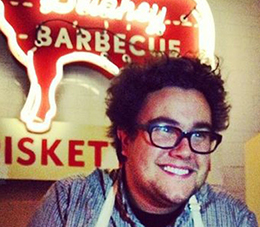

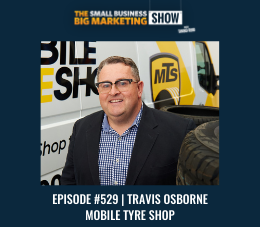
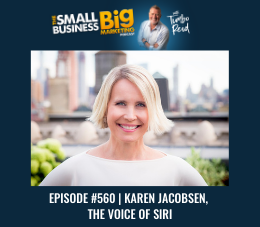
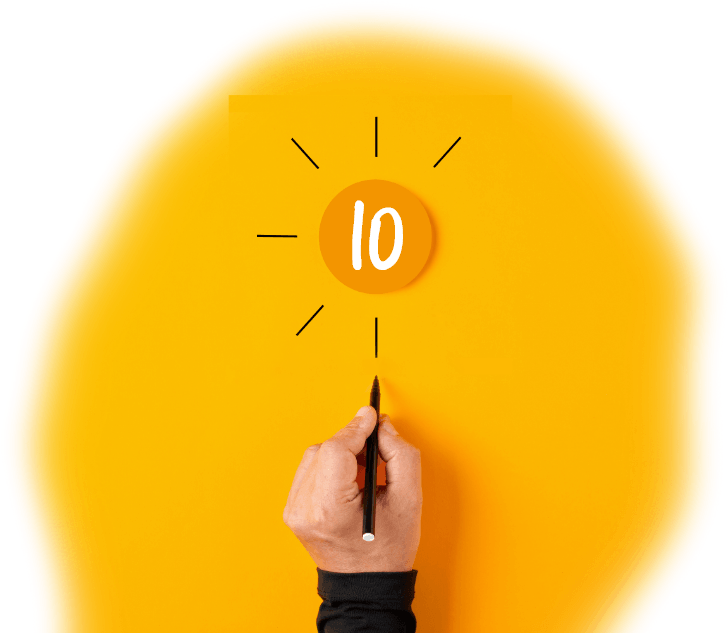
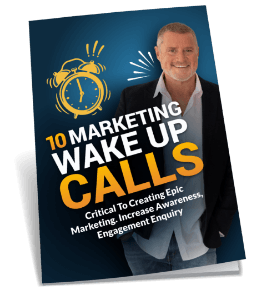
 Grab My 10 Marketing
Grab My 10 Marketing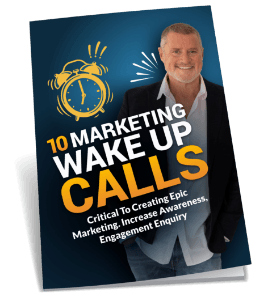
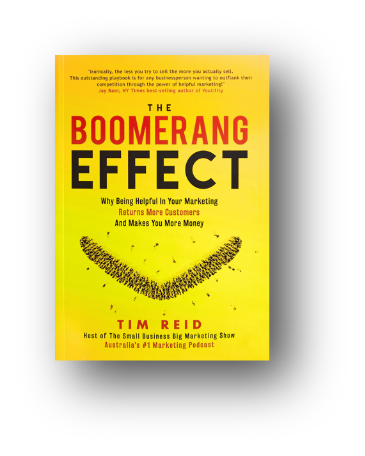
10 thoughts on “216 – How to market a restaurant with ex YouTube star turned New York BBQ house owner Daniel Delaney”
Maybe it was just the fact that I love hearing that American accent, but loved this interview. I love the speed at which Dan moves. I need to be drinking his cool aid. WOW! It gave me a bunch of ideas on sponsorship and testing. Do we get a round 2 to hear about his current business though? All I know is that he has great brisket. You left me wanting more.
Thanks Nick. It’s funny, I had every intention of going deeper into Dan’s current business, however he has such a great backstory that that took up a lot of the interview. Will there be a round two? Mmmmm, let’s wait and see ;0
Great interview with a self starter who is committed to TAKING ACTION! Thanks gentleman. Fanning the fire of getting stuff done!
My pleasure, Brad. GSD – that’s where it’s at!
Cool Aid? Nick, maybe you and I need to hit NY and have a beer with Dan!
I’d fly to NY just to walk that elevator garden & throw down one of Dans steaks.
Great interview Timbo!
Thanks Arn … I dare you to go to Daniel’s website and check out his brisket. If you find yourself licking the screen, don’t worry, you’re probably not the first one to do it!
Never been there if you can believe it Arn. I’d love to hit up the big Apple with you. Sounds like Timbo is planning a trip next year…maybe a SBBM Meetup is in order!
Really inspiring and insightful interview, great example of how the internet is impacting us in so many different ways
I was so interested in what @danieldelany said about LaunchRock that I went and had a look at the link provided (thanks Timbo) and I set up a page at http://7j2oukoy.launchrock.co/
It was quite easy 🙂
Thanks Timbo for always finding interesting and motivated people to interview, and for always asking excellent questions … and thank you Daniel for being so transparent.